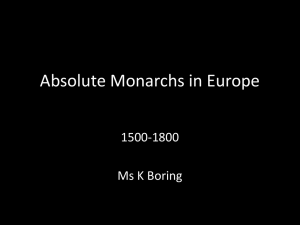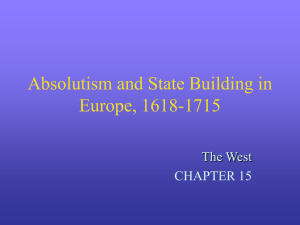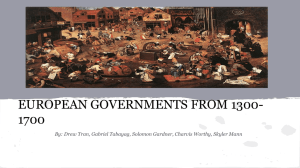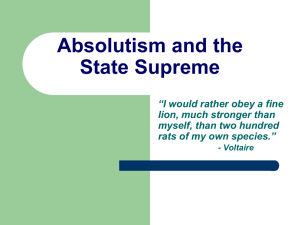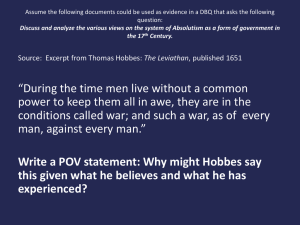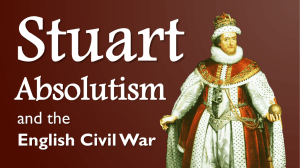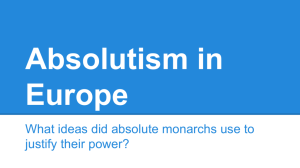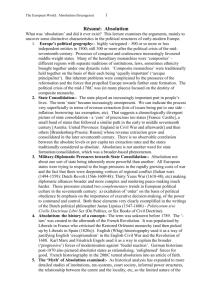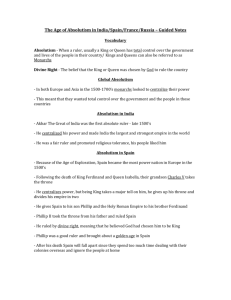6b Absolutism
advertisement
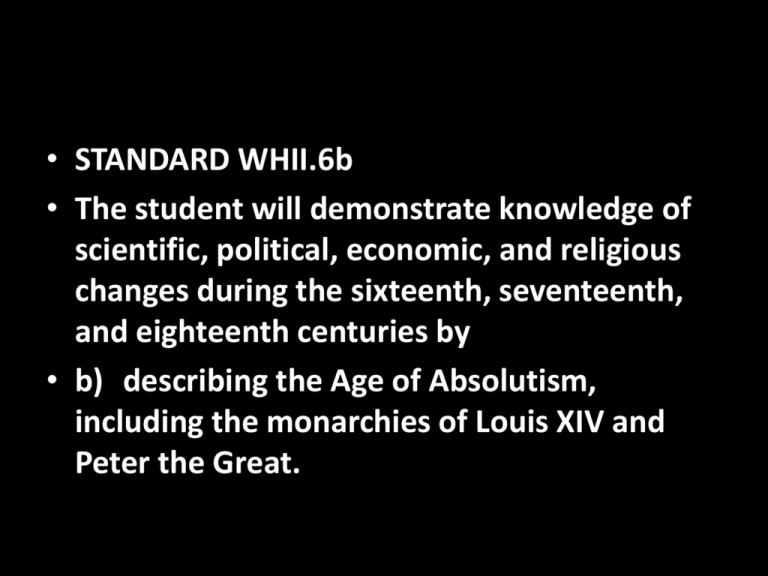
• STANDARD WHII.6b • The student will demonstrate knowledge of scientific, political, economic, and religious changes during the sixteenth, seventeenth, and eighteenth centuries by • b) describing the Age of Absolutism, including the monarchies of Louis XIV and Peter the Great. • The student will demonstrate knowledge of the Reformation in terms of its impact on Western civilization by – b) describing the impact of religious conflicts, the Inquisition, and Catholic Reformation on society and government actions. Scientific Revolution Absolutism Absolutism Essential Understandings • The Age of Absolutism takes its name from a series of European monarchs who increased the power of their central governments. • They claimed “absolute” control over everything! Absolutism • Princes of Germany fought the Catholics in the Thirty Years War • It was about – Religious freedom – Corruption – Power • It was also about Nationalism! Absolutism • Nationalism – feeling of loyalty to your nation • People were beginning to feel more loyalty to their countries than the Catholic church or any ruler. Absolutism • Absolutism – that all power reside in the monarch! • Powerful rulers built strong nations • The focus changes from Religion to Politics – From Reformation to Absolutism! • The focus changes from Religion to Politics – From Reformation to Absolutism! Absolute Rule Complete control over people and government. Characteristics of absolute monarchies Characteristics of absolute monarchies • First characteristic of absolute monarchy: – One person rules Characteristics of absolute monarchies • First characteristic of absolute monarchy: – One person rules • Second characteristic of absolute monarchy – Ruler continues ruling until death Characteristics of absolute monarchies • First characteristic of absolute monarchy: – One person rules • Second characteristic of absolute monarchy – Ruler continues ruling until death • Third characteristic of absolute monarchy – Power is inherited Characteristics of absolute monarchies • First characteristic of absolute monarchy: – One person rules • Second characteristic of absolute monarchy – Ruler continues ruling until death • Third characteristic of absolute monarchy – Power is inherited • Fourth characteristic of absolute monarchy – Ruler has COMPLETE control over everyone in the country (centralized power) Characteristics of absolute monarchies • First characteristic of absolute monarchy: – One person rules • Second characteristic of absolute monarchy – Ruler continues ruling until death • Third characteristic of absolute monarchy – Power is inherited • Fourth characteristic of absolute monarchy – Ruler has COMPLETE control over everyone in the country (centralized power) • Fifth characteristic of absolute monarchy – Ruler claims to rule by “Divine Right” Characteristics of absolute monarchies • First characteristic of absolute monarchy: – One person rules • Second characteristic of absolute monarchy – Ruler continues ruling until death Divine Rightof absolute monarchy • Third characteristic – Power is inherited A monarch is not subject to earthly • Fourth characteristic of absolute monarchy authority, the right toover rule comes directly – Ruler has COMPLETE control everyone in the country (centralized from God power) • Fifth characteristic of absolute monarchy – Ruler claims to rule by “Divine Right” Absolutism in France • King Louis XIII A brief explanation of Roman numerals. • Many Kings and queens were named the same. That’s because they wanted to honor their fathers and mothers, uncles and aunts, and all sorts o f relatives by using the same name. • But how do we tell them apart????? Continued… • They gave numbers to each person with the same name… The first… The second… The third… And so on… Continued… • But they used Roman numerals to do it… The first was just… I The second was… II And so on… Continued… Here is a list of roman numerals to help you recognize the many leaders. I = the first II = the second III = the third IV = the fourth V = the fifth VI = the sixth VII = the seventh VIII =the eighth IX = the ninth X = the tenth Numbers 10 – 19 involve putting the numerals for 1-9 after the X for ten: XI = the eleventh XV = the fifteenth XIX = the nineteenth Hopefully, this is helpful! Here is a list of roman numerals to help you recognize the many leaders. I = the first II = the second III = the third IV = the fourth V = the fifth VI = the sixth VII = the seventh VIII =the eighth IX = the ninth X = the tenth Numbers 10 – 19 involve putting the numerals for 1-9 after the X for ten: XI = the eleventh XV = the fifteenth XIX = the nineteenth Hopefully, this is helpful! Absolutism in France • King Louis XIII Absolutism in France • King Louis XIII • Sickly Absolutism in France • King Louis XIII • Sickly • Cardinal Richelieu took over Absolutism in France • Took more power • Weakened the Huguenots (French Protestants) • “One faith, One law, On king!” Absolutism in France • Focus of the 30 Years War went from religious to political Absolutism in France • Louis XIII dies • Louis XIV takes over Absolutism in France • Strong central government (all the control belongs to Louis) • He built Versailles Reformation in France Absolutism in France • Versailles • A huge palace Absolutism in France • Versailles • A huge palace • All nobles had to spend some time there! – (It helps Louis keep an eye on them!) – It was a symbol of his power Absolutism in Russia • Peter the Great! Absolutism in Russia • Wanted Russia to be like European nations in culture Absolutism in Russia • Wanted Russia to be like European nations in culture Westernization Societies adopt Western (European) culture in many areas of life Absolutism in Russia • Wanted Russia to be like European nations in culture • Russians had to… – Shave their beards – Dress like European countries Absolutism in Russia • Built a new capital city: – St. Petersburg… named after himself – On the Baltic Sea Absolutism in Russia • He built it on swamp land next to the North Sea – closer to Europe – It was a major port! Absolutism in Russia • He moved the capital from Moscow to there Absolutism in England Absolutism in England • Queen Elizabeth I Absolutism in England • Rejects absolutism • Ruled wisely and loved the Renaissance ways! • This time in England was so good, people now call it the Elizabethan Age Absolutism in England • She was known as the Virgin Queen • Virginia was named after her • When she died she had no heir to the throne… Absolutism in England •BUT… Absolutism in England • Queen Elizabeth I gave way to her cousin: • James I Who? Henry VII Arthur Henry VIII Mary I "Bloody Mary" Elizabeth I Margaret Edward VI Mary James V King of Scotland Mary Stuart Queen of Scotland James I Charles I Civil War Commonwealth Oliver Cromwell Charles II "Merry Monarch" James II Henry VII Arthur Henry VIII Mary I "Bloody Mary" Elizabeth I Margaret Edward VI Mary James V King of Scotland Mary Stuart Queen of Scotland James I Charles I Civil War Commonwealth Oliver Cromwell Charles II "Merry Monarch" James II Henry VII Arthur Henry VIII Mary I "Bloody Mary" Elizabeth I Margaret Edward VI Mary James V King of Scotland Mary Stuart Queen of Scotland James I Charles I Civil War Commonwealth Oliver Cromwell Charles II "Merry Monarch" James II Henry VII Arthur Henry VIII Mary I "Bloody Mary" Elizabeth I Margaret Edward VI Mary James V King of Scotland Mary Stuart Queen of Scotland James I Charles I Civil War Commonwealth Oliver Cromwell Charles II "Merry Monarch" James II Absolutism in England • Queen Elizabeth I gave way to her cousin: • James I • He believed in Divine Right… the belief that God has chosen you to rule • He Believed in absolutism Henry VII Arthur Henry VIII Mary I "Bloody Mary" Elizabeth I Margaret Edward VI Mary James V King of Scotland Mary Stuart Queen of Scotland James I Charles I Civil War Commonwealth Oliver Cromwell Charles II "Merry Monarch" James II Absolutism in England • His son (son of James I) was Charles I • Charles also was also an “absolute” ruler… Absolutism in England • England also had a parliament – a group of elected people who make laws Absolutism in England • England also had a parliament – a group of elected people who make laws • He and parliament disagreed so much it led to an English Civil War! Absolutism in England • England also had a parliament – a group of elected people who make laws • He and parliament disagreed so much it led to an English Civil War! • Parliament won and the power of the king was greatly reduced! Henry VII Arthur Henry VIII Mary I "Bloody Mary" Elizabeth I Margaret Edward VI Mary James V King of Scotland Mary Stuart Queen of Scotland James I Charles I Civil War Commonwealth Oliver Cromwell Charles II "Merry Monarch" James II Essential Questions Who were the absolute monarchs? What effect did the absolute monarchs have on their countries?
